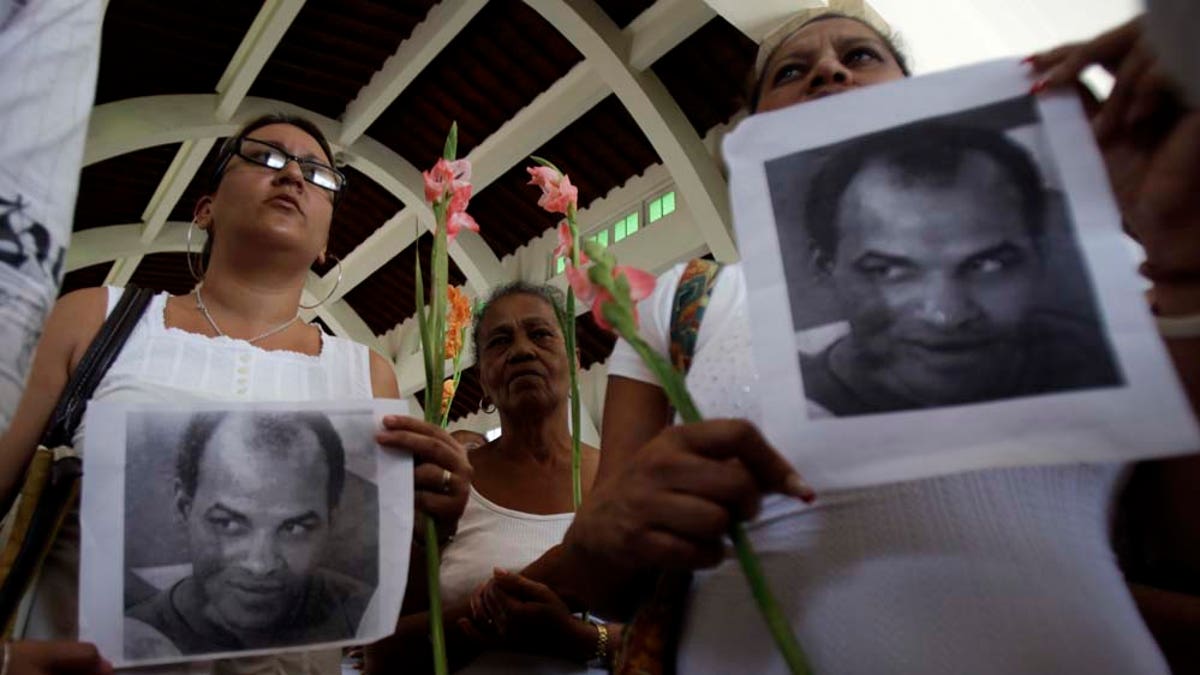
Members of Cuba's dissident group Ladies in White hold up photographs of the late political prisoner Orlando Zapata Tamayo during their weekly march in Havana, Cuba, Sunday, Feb. 6, 2011. Tamayo died on Feb. 23 following a lengthy hunger strike. Cuba freed Guido Sigler , a prominent political prisoner, on Friday and the Roman Catholic Church said Angel Moya, another political prisoner, would be released soon and allowed to stay in the country. (AP Photo/Javier Galeano) (AP2011)
“If Egypt did it, why not Cuba?” a new Facebook page asks in its title.
Last week, Cuban dissidents and Cuban American leaders say, provided an answer.
As scores of Cubans on the island took to the streets for a peaceful observation of the one-year anniversary of the death of Orlando Zapáta Tamayo -- who perished after an 85-day hunger strike to protest his treatment as a political prisoner – government security forces detained participants or put them under house arrest.
“I was getting ready to go to a vigil, and there were four police cars on my block alone to intimidate and harass me,” said Jorge Luis Garcia Pérez, a founder of the Orlando Zapáta Tamayo National Civic Resistance Front, a coalition of some of the most active pro-democracy groups in Cuba, in a telephone interview from his home in the province of Villa Clara.
“Days before the vigils for Orlando Zapáta, they started harassing people, arresting them, being very visible, with patrols, on their blocks, in their neighborhoods. The oppression is ubiquitous, it's 24/7.”
In his most recent weekly syndicated column, Cuban American writer Miguel Pérez said others often ask him why Cubans on the island have not risen up against the communist regime. Those questions, Pérez said, have become more common since the mass uprising in Egypt this year that brought an end to the regime of President Hosni Mubarak.
“Why, you ask, don't the Cuban people run out to the streets and do what we have seen recently throughout the Middle East and North Africa?” Pérez wrote in his column, entitled “Watching Others Realize My Dream.”
“Well, first, because most of them have not seen it," he wrote. "The government-controlled Cuban media obviously want to prevent the domino effect from happening and show the Cuban people very little of what is actually happening in the rest of the world.”
For all the repression in many Middle Eastern countries, Pérez said, Cuba’s is far more suffocating. The vast majority of Cubans on the island do not have computers and cell phones, much less access to the technology that many in the Middle East used to feed the momentum for an uprising, say Cuban Americans.
“There is repression, and then there is Cuban repression,” said Pérez, who is chairman of Journalism, Communications, and Theatre at Lehman College, “which is about absolute control and intimidation.”
“Many people don’t even have [land line] telephones,” Pérez said. “When I call my relatives, I have to call a neighbor who has a telephone and who goes to find them.”
To be sure, some of Cuba’s most prominent dissidents – among them Garcia-Pérez, who is known as “Antúñez” -- have Twitter accounts and cell phones, often sent to them by Cuban exile organizations. Garcia-Pérez has a Twitter account, as well as a blog, www.nimecallonimevoy.wordpress.com
“But it’s a small group of people who have these,” Pérez said. “Most of the people who have access to the Internet are people with the Communist party, so if dissidents post something about a protest, the first people who will find out are people with the government.”
Sen. Robert Menendez, the son of Cuban immigrants, said nipping opposition – and public expressions of dissent – at its root has been a hallmark of Cuba’s communist regime.
Cuban authorities long have quashed “any attempt or minimal effort to organize,” said Menendez, D-NJ.
Now, the sense of urgency over cracking down on dissent is even more pronounced, Menendez said.
“There’s concern on their part about letting news of the world come into Cuba that might give any idea to someone about protests or starting a movement,” he said.
The degree to which Cuban officials are worried about the spread of the uprisings in the Middle East, he said, is difficult to gauge by crackdowns on protesters.
“They crack down simply as a normal course of events,” he said.
Still, there are signs that they are watching with concern, Menendez said. Cuban authorities, he said, have been scrambling the broadcasts of Radio Martí, which is financed by the U.S. government, more than usual.
“What Mubarak did in the middle of the turmoil, shutting down access to the Internet for a few days, is what happens in Cuba every day,” he said.
But while the obstacles to an Egypt-style revolt tower in Cuba, Cuban dissidents and Cuban Americans who oppose the regime feel that a populist push for democratic change will come to the island.
Some Cuban Americans say that the events in Egypt have convinced them to send their relatives in Cuba cell phones and other electronic products.
Asked about how effective such items would be if people cannot access service, Pérez said: “The people, I think, would find a way.”
In Cuba, dissident Garcia Pérez said he believes that his compatriots will force a democratic change, albeit in their own way.
“It won’t happen the same way as in Egypt, but all signs are that there will be an uprising,” Garcia Pérez said. “It’s inevitable. There’s an energy, a restlessness for liberty, that cannot be turned back.”
“People everywhere have an inherent hunger for freedom,” he said, then quoted Cuban poet and revolutionary philosopher Jose Martí. “As Martí said, ‘Man loves liberty, even when he does not know that he does.’”
Elizabeth.Llorente@FoxNewsLatino.com
Follow us on twitter.com/foxnewslatino
Like us at facebook.com/foxnewslatino




